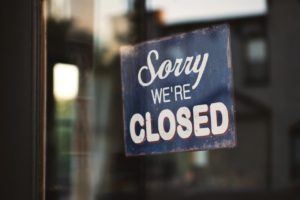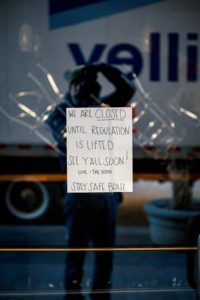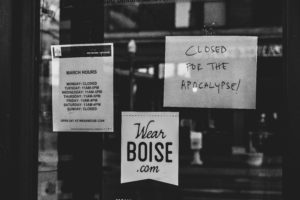I t’s March 2021. We have been living within some sort of COVID-19 affected reality for one year. In some ways it feels like this started just a few months ago; in other ways, it’s hard to remember life before the pandemic.
t’s March 2021. We have been living within some sort of COVID-19 affected reality for one year. In some ways it feels like this started just a few months ago; in other ways, it’s hard to remember life before the pandemic.
If we rewind just one year — before 500,000 COVID-related deaths and at least 100,000 permanent business closures due to erratic government mandates and economic depression — what we see is quite tragic given our current state of living. Leading up to and in the first week of March 2020, Americans were told if they wanted a test they could get a test (wasn’t true), that the tests were “perfect” (they weren’t), and that in a couple days the case number would be “close to zero” (if only). Whiplash hit when a national emergency was declared, and March 16, 2020 brought for the first time, “15 Days to Stop the Spread.”
Fifteen days.
 It’s heartbreaking to think what has come simply from throwing the government at the problem of a dangerous virus. The truth is that no lockdowns, no social distancing, and no obsession with or denial of the pandemic would have ever stopped it from taking many American lives. Without utterly stopping anyone from leaving their homes for likely more than 15 days, this virus was going to spread. While we could have been better prepared or we could have had leaders who were more concerned with facts than the fear they use to win elections, we had no power to stop COVID-19 from spreading.
It’s heartbreaking to think what has come simply from throwing the government at the problem of a dangerous virus. The truth is that no lockdowns, no social distancing, and no obsession with or denial of the pandemic would have ever stopped it from taking many American lives. Without utterly stopping anyone from leaving their homes for likely more than 15 days, this virus was going to spread. While we could have been better prepared or we could have had leaders who were more concerned with facts than the fear they use to win elections, we had no power to stop COVID-19 from spreading.
By the end of March 2020 more than 30 states had imposed general “stay-at-home” orders. When those didn’t work, further shutdowns, mask and social distancing mandates, school closures, and a $2.2 trillion coronavirus relief package were employed as 22 American deaths became 10,000 in less than 30 days.
Unintended consequences are par for the course when it comes to expanded government action. While we have continued to track the effects of COVID-19, what is harder to track is the effects of lockdowns for Americans. Recent studies have shown at least a 30% increase in depression and anxiety in adults, and more than 1 of 2 young adults now show symptoms of anxiety or depressive disorder. Children who were under the strictest quarantines have been found to be four times more likely to experience PTSD. Long after the vaccine has brought us much closer to herd immunity, we will still be feeling the devastating mental effects from mostly honest attempts to solve a problem that could never have been solved.
Libertarian action in the face of a pandemic would be different, not because we have all the answers and others do not, but because the tenets of liberty are based in principle, not politics.
 We believe that regardless of the crisis we face, individual liberty is the best road that leads to the fewest unintended consequences. A Libertarian approach would be for government to be transparent and honest about what is known and what is not known, to give the best possible suggestions and advice based on the scientific evidence, and to urge individuals to consider their safety and that of their fellow Americans in every decision they make. The focus of action would be on ensuring that tests were readily available and not held up in bureaucratic red tape, and to provide necessary support for hospitals caring for the sick and scientists working on a vaccine.
We believe that regardless of the crisis we face, individual liberty is the best road that leads to the fewest unintended consequences. A Libertarian approach would be for government to be transparent and honest about what is known and what is not known, to give the best possible suggestions and advice based on the scientific evidence, and to urge individuals to consider their safety and that of their fellow Americans in every decision they make. The focus of action would be on ensuring that tests were readily available and not held up in bureaucratic red tape, and to provide necessary support for hospitals caring for the sick and scientists working on a vaccine.
Libertarians don’t want to simply dissolve government and never consider what happens to others. We want individuals to be free. A government that doesn’t have control over your life loses the power to make everything about who holds the reins, and therefore may function as it should.
Every day Americans are discovering the message of Liberty and realizing this is exactly where they belong. Right now there are so many who are just looking for hope and the potential for a better future, and they just need to find us. Your gift will make that possible.
[su_button url=”https://my.lp.org/contribute/donation/?source=March2021″ style=”glass” background=”#fed000″ color=”#222222″ size=”7″ text_shadow=”0px 0px 0px #000000″]Make a One-Time Donation[/su_button] [su_button url=”https://my.lp.org/contribute/new-monthly-pledge/?source=March2021″ style=”glass” background=”#fed000″ color=”#222222″ size=”7″ text_shadow=”0px 0px 0px #000000″]Become a Monthly Donor[/su_button]

